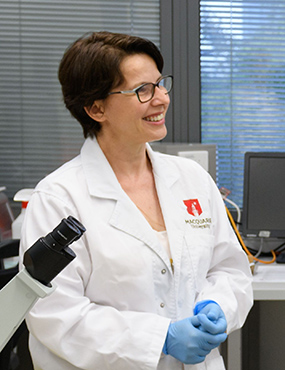A simple blood test could soon diagnose cancer
Researchers are using liquid biopsies in melanoma diagnosis and treatment monitoring.

Advancing cancer diagnoses
“Currently, the technology is used to detect late-stage melanoma,” Professor Helen Rizos said.
By analysing liquid biopsies – blood samples instead of conventional tissue biopsies – Rizos’ team investigates patients’ response to certain cancer treatments and also predicts survival outcomes.
One member of her team, Dr Russell Diefenbach, came to Macquarie University Health in 2017, keen to be involved in cancer research with tangible clinical outcomes. He’d previously worked at the Westmead Institute for Medical Research for 20 years.
“We’re trying to characterise a tumour with a single blood test,” Diefenbach says. “We want to link the work we do in the lab with what we do in the clinic.”
Liquid biopsy research is non-invasive and more easily allows researchers to monitor how patients respond to treatment, surgery and radiotherapy. “Liquid biopsies have been around for a while now,” says Dr Jenny Lee, a medical oncologist, PhD student and the clinical lead in Rizos’ team, “but this is the closest we’ve come to impacting patients’ lives.”
Working with patient samples from Melanoma Institute Australia, the team is currently making their tests more sensitive and targeted to identify mutated DNA. At the same time, they are building up a cancer biobank at Macquarie University Health of blood samples accompanied by clinically annotated data. It’s similar in scope to the Neurodegenerative Disease Biobank that already exists at Macquarie University’s Centre for MND Research.
The researchers’ next step is to apply this liquid biopsy technology to cancers other than melanoma. They aim to design clinic trials and gain government accreditation, so clinicians can use it as part of routine clinical care. Rizos’ team is collaborating with others in Australia and globally who are doing similar research.